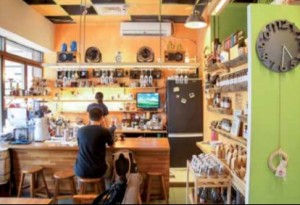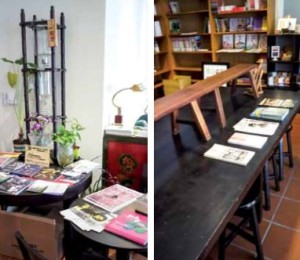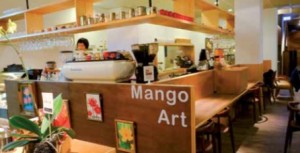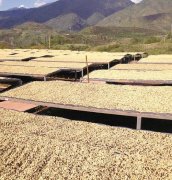Introduction to the Development of Chinese Fine Coffee and Coffee in Taiwan
Formosa is a good impression that Taiwan has brought to the world! In this green island with an area of only 36193 square kilometers, the vibrant coffee multiculturalism continues to bloom here, giving Taiwan an important place not only in Asia, but also in the coffee field of the world. Taiwan, known as the "beacon of democracy in Asia and the world", the coffee industry, like this reputation, leads ships to create different horizons. Below, through a professional coffee maker and a contemporary student from a different point of view to describe the current situation of our coffee industry in Taiwan.
"Cross-border, innovation, integration, own"-on the current situation of diversification in Taiwan's coffee industry
In the midsummer afternoon of the weekend, when you walk into the "Mango Cafe" in Douliu, a town in southern Taiwan, the aroma of coffee is coming with air-conditioning and music, and you will find that in this cafe, which covers an area of more than 90 ping (about 300 square meters), there is a live music performance. the audience is enjoying the mellow coffee while immersing in the melodious music performance. In fact, the Mango Coffee Cultural Center not only often holds live music performances, but also holds famous lectures. Almost every week, people from different fields share their expertise and stories in their respective fields with audiences from all over Taiwan in the Mango Cafe. "the coffee here is very delicious, and it often holds lectures and public welfare activities. It feels great!" Guo, a coffee fan who lives in Douliu, said so.
Then take the scene to Taipei, the largest city in northern Taiwan, where there is a hustle and bustle of people in the "FabCafe" in Huashan Special Economic Zone. In this cafe, a group of people are discussing how to turn their ideas into entities through the services provided by FabCafe.
It turns out that FabCafe is not only a professional boutique cafe, but also equipped with the latest technology of 3D printers, laser cutting equipment and other digital manufacturing equipment, so that people interested in manufacturing, creation and creativity can show their skills on the spot. "I often see 3D printing on TV, but I didn't think I could try it myself here!" Miss Huang, who has visited FabCafe for the second time, said.
Liao Siwei and Lim Dong-Won, operators of Mango Coffee and FabCafe, are both well-known professionals in Taiwan's boutique coffee industry, and providing a good cup of coffee is one of the basic jobs for them. "We were thinking about what other combinations are beautiful, interesting and exciting? It is not an initiative that has never been done before, but it really brings beauty to people. " Liao Siwei said so. "Coffee is a platform, a link that allows a lot of things to come together, and I think the meaning of FabCafe is very complete." Lim Dong-Won, the 2004 TBC champion, sparkled with excitement in his eyes as he described the concept of FabCafe.
With the growing number of people exploring more possible coffee industries in Taiwan, such as Mango Coffee and FabCafe, the coffee industry is beginning to think about ideas that coffee makers can also do besides brewing a cup of coffee, which can be combined with other fields to create new sparks.
In addition to the wave of "cross-border and innovation", Taiwan's coffee market is also showing a very rare situation in other parts of the world: the unimaginable inclusiveness of the market and the diversity of coffee culture! All kinds of coffee cultures exist and coexist on this island with a population of 21 million. The people of Taiwan fully tolerate and accept these different coffee cultures.

Convenience store coffee
Taiwan is currently the region with the highest density of convenience stores in the world. On this island of 21 million people, there are already 4861 "7-ELEvEN" and 2870 "family convenience stores". There are four major convenience stores: 7-ELEvEN, Family, Laierfu and OK, with a total of more than 10000 stores, with an average of one for every 2100 people and one for every 500m. Since 7-ELEvEN launched its convenience store coffee brand "CityCafe" in 2004, CITYCAFE now consumes more than 100 million people a year and sold about 180 to 200 million cups last year, making it the largest inexpensive coffee chain in Taiwan. In Taiwan, you can walk into a convenience store 24 hours a day, choose your favorite coffee drink from the 12 freshly brewed coffee drinks served on the spot, and get a cup of Italian coffee drink milled and brewed on the spot in three minutes.
If you are from the United States, you will be surprised that Taiwan convenience stores offer a wide range of coffee styles. Taiwan convenience stores sell even more items of freshly brewed espresso than the third wave of HandsomeCoffee in Los Angeles. Convenience stores offer affordable, fast espresso drinks, creating a broad masses of coffee consumers in Taiwan. Many Taiwanese consumers who used to drink only tea drinks began to drink coffee because of coffee in convenience stores, which has gradually become an indispensable habit in their daily life. Coffee is so popular in Taiwan that convenience store coffee is definitely the primary contributor. If this is your first visit to Baodao, please don't miss the "convenience store coffee", a unique and common coffee scenery in Taiwan.

Traditional Japanese style and New Generation Japanese Coffee
Traditionally, Taiwan's coffee culture has been influenced by Japanese culture. Dark wooden bar tables and chairs, hand-brewed follicle coffee and siphon pot coffee seem to flow slowly. "Honeyda Coffee", which has been open in Ximenting for more than 50 years, is the representative of traditional Japanese coffee. In addition to traditional Japanese coffee, there is also a new generation of Japanese coffee in Taiwan, with bright space and simple and warm decoration, offering self-baked Japanese hand-brewed coffee and Japanese light food, which is represented by the "ATTS" Cafe in Banqiao District, New Taipei City. "ATTS wants to serve as a bridge between Tokyo, Japan and Taipei, Taiwan, so that people on both sides can fully feel each other's delicacy." So said Atsushi Ito, the founder of ATTS and a barista certified by the Japan Fine Coffee Association.
Seattle style and American Coffee
Starbucks coffee from Seattle in the United States has been developing in Taiwan since 1998. In 2013, there were as many as 300 Starbucks coffee shops on this island. In terms of the density of the brand's exhibition stores in a single region, Taiwan ranks first in the world. Apart from the chain Starbucks Coffee, which inherits from American coffee culture, boutique cafes that offer espresso drinks are also very popular in Taiwan. Mojocoffee, which has three stores in Taichung, is one of the representatives.
It is worth mentioning that the American Fine Coffee Association (SCAA) has also set up an authorized education center based in Taichung to carry out Q-Grader training and certification, cup testing training, lecturer training, and so on. American boutique coffee culture has a great influence on Taiwan's coffee industry, and its influence is growing day by day.
Italian coffee
In addition to Seattle's espresso culture, Taiwan also has a coffee culture directly inherited from Italy, which is booming! IIAC, the international Italian coffee tasting association, is based in Taichung. Lecturers from Italy frequently come to Taiwan to hold promotional activities and professional courses. Taiwanese consumers are welcoming Italian coffee culture with open arms! The "Perini Cafe" and "Jingcheng Business" located in Taichung faithfully present the authentic Italian coffee culture.

Nordic coffee
FikaFikaCafe, which opened next to Yitong Park in Taipei in January 2013, inherits the Nordic Scandinavian coffee culture and presents the authentic Norwegian, Danish and Swedish boutique coffee culture. Since then, the aesthetics of Nordic extremely shallow roasted coffee has begun to sprout in Taiwan, and this is also the first coffee shop with Nordic coffee culture in China, Hong Kong, and Taiwan.
Taiwanese Coffee and Action Coffee
In addition to the above coffee culture from all over the world, Taiwan has also developed many coffee makers who integrate various cultures and show their own unique style. For example, "Coffee Leaf" in Taichung, "Hot Pot Coffee" in Taipei, "CoffeeSweet", "RofusCafe", and "Coffee Forest Coffee" in Kaohsiung, these coffee manufacturers who have their own unique styles and cannot be classified are also welcomed by Taiwan consumers, bringing more elegant demeanor and diversity to this coffee-loving island.
"Action Coffee" is also one of Taiwan's unique coffee culture features. The word "Action Coffee" means that coffee shops are mobile and mobile at any time. Mobile coffee shops can be seen in places with beautiful scenery from the mountains to the seaside in Taiwan. There are car modifications and mini action cafes that use e-bikes or even bicycles. Chen Paocha, a university student at Pingtung University, is one of them. He has converted his bicycle into a mobile coffee stand and usually sells coffee in the business district. Since the summer of 2013, he has traveled to Taiwan with very little cash on his bike, selling coffee to pay for the trip while visiting many cafes in Taiwan.
A densely populated island has and presents such a diverse coffee culture from all over the world, and what is surprising is the inclusiveness and acceptability of the people of Taiwan. Taiwan people who love coffee use their tolerance, so that these completely different styles of coffee culture coexist peacefully here at the same time. I should say that being a coffee lover in Taiwan is happy! This unique island of Taiwan will continue to float the aroma of coffee, bringing the world a cross-border, integrated, innovative and unique coffee experience. Do you want to experience it? Let's take a coffee trip to Taiwan. You won't be disappointed.
Contemporary impression of Coffee in Taiwan
Howard。 Bihar Howard Behar (former president of Starbucks International): "We are not engaged in a business of selling coffee to guests, we are running a business of selling coffee by people."
Brew coffee with the mind of making tea
According to the survey data of ICO International Coffee Organization, Taiwan's annual coffee market is more than 40 billion, and currently brewed coffee accounts for 35% (more than 13.5 billion). At first glance, it is amazing, but compared with Europe and the United States, Taiwan still has great potential for development.
Since 1998, the coffee chain began to sprout in Taiwan, until after 2003, the chain actively developed to promote the fermentation of coffee drinking culture in Taiwan. In 2007, convenience stores officially entered the coffee market, accompanied by the trend of personalized cafes. Due to consumers' more diversified and higher expectations for coffee experience, coffee and local culture have more mutual integration and breakthroughs. Chen Zhihong, chairman of Jin Yuansheng Industry, who designed the condensed mocha pot and steam milk tube, once pointed out: "Taiwan puts the kung fu of soaking Kungfu Tea on making coffee, while the Japanese also copy the spirit of the tea ceremony on making coffee. Tea is the leaf of a plant, and coffee is the seed of a plant. Even when Italians come to Taiwan, they are overwhelmed by the skill of Taiwanese in brewing coffee. The most complicated places in the world to make coffee are Taiwan and Japan. "
Taiwan has a long history of tea tasting. Tea knowledge is not limited to all schools, and tea drinking is not casual among ordinary people. This kind of habit forms a culture of tasting. When it comes to coffee, it is natural for people in this land to have subconscious demands for evaluation, brewing and playing tests. If the arrival of coffee chains brings new pages to Taiwan coffee, such as Starbucks offering fancy coffee, then personalized single-store coffee is more challenging to exquisite fancy coffee.
Viewing Coffee from the Perspective of the masses in Taiwan
In 2012, we analyzed Taiwan's coffee market in detail from the perspective of professional coffee professionals. In 2014, we talked about coffee not from the perspective of coffee, but from a chaotic perspective. The so-called chaos does not mean chaos and disorder, but an order of its own in the chaos. Continuing the unique cultural tone of Taiwan, in the cafes lined with each other in the streets, the style of mutual industry without disturbing each other has become a chaotic performance art.
There is no denying that the main coffee experience of most Taiwanese (especially young people) is still Starbucks. Among other things, this kind of chain system plays an important role in the promotion of mass market coffee, and the reason why Taiwan has been so hot in the second wave depends on the promotion of Starbucks. In recent years, Starbucks is committed to the third wave of transformation, which is bound to lead a new change in the market. However, at a time when the second wave is booming and slightly overlaps with the third wave, Taiwan has achieved various kinds of composite platforms through its own highly inclusive culture, creating more possibilities for cafes and coffee itself.
"Space" is the characteristic of Taiwan coffee.
The provision of 'place' is the biggest function of Taiwan's coffee chain. Seattle Gourmet Coffee Operations Manager you Zongyi once analyzed this in an interview, and Xu Guangyu, general manager of Uni-President Starbucks, agreed. "the differences in coffee culture can be seen in the different peak business hours of coffee chains in the United States and Taiwan." Xu Guangyu added that Starbucks in the United States is the busiest in the morning, because coffee is used as an important drink for breakfast in the United States, but Starbucks in Taiwan is buzzing in the afternoon, and what people need is a place to socialize.
Briefly and Tang Shuwen (a young Taiwanese writer who is also good at several kinds of literature) talked about her personal impression of Taiwanese coffee. Even though she was addicted to coffee, her coffee experience came more from when her mother was brewing at home. But what about the cafes in Taiwan? She paused and said, "Hmm." It is a kind of coffee shop with more salon flavor, which often combines lectures, exhibitions, screenings and other activities. What I feel in a cafe like that seems to be more intellectual atmosphere, community-like identity, and space with some kind of social mobilization potential than coffee itself. Of course, I still have to stress that this is a very limited experience. I believe that most people in Taipei mainly experience coffee at Starbucks, but Taiwan's non-chain cafes often have a strong atmosphere of 'local' (community or student circle) and 'underground' (social movement living space), which I like very much. "
The playing Art of Coffee in Taiwan
Nine out of ten people in charge of cafes in Taiwan do not come from relevant departments. This brings an unlimited environment to the industry from different learning backgrounds, which increasingly reflects the characteristics of Taiwan's cultural melting pot. Various types of themed cafes, because of the diversification of consumption, lead to the diversification of various types of cross-industry cooperation, or provide alcohol, which combines the cultural trends of music, installation art, and so on, to give coffee more direction.
Mix _ Hun, which is adjacent to normal University, is a space that combines commune, humanities and caffeine, operates with the concept of Co-working as the main axis, and turns the cafe into an action office, building a media bridge for workers in different fields. The AKUMACACA Coco Design Humanities Cafe near Renai Circle, owned by a well-known design company, provides an enlightening space that attracts many designers and uses it as a place for inspiration. Sister store AHouse uses cafes as a platform to share Akabella, with drinks, meals and cordial services of the same level as cocoa designers, and there are many Akabella performances in the evening.
FabCaf é, which opened in Huashan Cultural and Creative Park in May this year, has raised the topic for multiple and complex platforms. The founder of Tim, who has an architectural background, has cooperated with FabCaf é of Japan to introduce novel 3D printing technology and attract the attention of people from all over Taiwan. Its small production meets the dream that everyone can become a designer, everyone can produce their own unique design, and ordinary people also have the opportunity to make a figure in the design circle. In addition to creating a new design platform, Mr. Lim Dong-Won, another founder of FabCaf é, copied GABEE. Level of catering and service, for FabCaf é to build a solid coffee base, in providing a diverse platform, not careless, as the cafe's most important meals, drinks and services. In addition to the common beverage items, we will also change different creative drinks according to the season. recently, we have even launched the option of smart filter cups, so that we can experience the complete brewing of individual coffee on the dinner table, apart from the display of the strength of professional drinks, the endless freshness is an amazing spark that can not be ignored. FabCaf é undoubtedly sets a new milestone for coffee circles and design circles, injecting more elements of playing with art.
Coffee Life in Taiwan
Coffee is a way of life, which changes with countries and regions, and it looks like that in Italy, but it is different in the United States, and what each city is used to breathing is even different. Coffee life in Taiwan is colorful. We can gather in a spacious cafe in the urban agglomeration. You can also stop 4.5 kilometers on Highway 197 in Taitung, go in and out freely, drink and cook yourself in a cafe that works as a wax dye designer. Or travel through Tainan and spend the night shining in the middle of the cultural map, following the warm Zhengxing Cafe in Japan.
In addition to the coffee shop presentation, Taiwan also has no restrictions on the breakthrough of coffee itself. The meaning of coffee in Taiwan has changed from humanities and arts to a way of life. Located in Keelung Mountain City, Marujiao Coffee, in addition to decorating the atmosphere and coffee flavor, as well as providing very local flavor food, also uses coffee bean sacks as materials to design a handbag, which is very creative. Even though it is not a huge textile group, the Xingcai Company, which enjoys an international reputation and owns patents, draws a thread from coffee. Among all kinds of fabric raw materials, Taiwan's native Xingcai Company has developed coffee yarn, just like Taiwan's high-level R & D technology in all walks of life, outside the science and technology industry, Xingcai Company holds the cocoon of coffee yarn and circles Taiwan's textile industry forward. If pluralistic tolerance has contributed to Taiwan's endless inspiration, then coffee must be a new wire in this era, sewing closely into our lives with the needle of tolerance.
Important Notice :
前街咖啡 FrontStreet Coffee has moved to new addredd:
FrontStreet Coffee Address: 315,Donghua East Road,GuangZhou
Tel:020 38364473
- Prev

China Coffee Market Yunnan Coffee Wants to Fight for Pricing Power
From 390,000 mu five years ago to 1.3 million mu in 2012, the rapidly expanding coffee planting industry in Yunnan suffered a cold market last year. First, at the beginning of last year, international giant Nestle announced that it would stop buying, triggering a panic selling among farmers. At the end of last year, the purchase price of coffee beans fell to a five-year low, approaching the planting cost line. In Yunnan survey found that under many challenges, cloud
- Next

Call for stop sale, stop abuse and expose the inside story of Kopi Luwak industry.
PETA, a member of PETA Asia, has revealed that civet coffee (also known as Kopi Luwak) is in production to reveal the miserable life of civets. PETA called on retailers to stop selling civet coffee and stop abusing animals. Musk cat, in fact, should be called coconut cat, this looks silly and some aggrieved little thing, although it looks a bit like a raccoon, but it is really a raccoon
Related
- The ceremony is full! Starbucks starts to cut the ribbon at a complimentary coffee station?!
- A whole Michelin meal?! Lucky launches the new "Small Butter Apple Crispy Latte"
- Three tips for adjusting espresso on rainy days! Quickly find the right water temperature, powder, and grinding ratio for espresso!
- How much hot water does it take to brew hanging ear coffee? How does it taste best? Can hot water from the water dispenser be used to make ear drip coffee?
- What grade does Jamaica Blue Mountain No. 1 coffee belong to and how to drink it better? What is the highest grade of Blue Mountain coffee for coffee aristocrats?
- What are the flavor characteristics of the world-famous coffee Blue Mountain No. 1 Golden Mantelin? What are the characteristics of deep-roasted bitter coffee?
- Can I make coffee a second time in an Italian hand-brewed mocha pot? Why can't coffee be brewed several times like tea leaves?
- Hand-brewed coffee flows with a knife and a tornado. How to brew it? What is the proportion of grinding water and water temperature divided into?
- What is the difference between Indonesian Sumatra Mantinin coffee and gold Mantinin? How to distinguish between real and fake golden Mantelin coffee?
- What does bypass mean in coffee? Why can hand-brewed coffee and water make it better?

